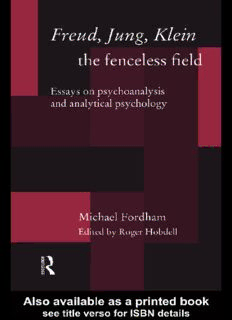
Freud, Jung, Klein - The Fenceless Field: Essays on Psychoanalysis and Analytical Psychology PDF
Preview Freud, Jung, Klein - The Fenceless Field: Essays on Psychoanalysis and Analytical Psychology
Freud, Jung, Klein—the fenceless field Freud, Jung, Klein—the fenceless field Essays on psychoanalysis and analytical psychology Michael Fordham Edited by Roger Hobdell London and New York First published 1995 by Routledge 11 New Fetter Lane, London EC4P 4EE This edition published in the Taylor & Francis e-Library, 2005. “To purchase your own copy of this or any Taylor & Francis or Routledge's collection of thousands of e-Books please go to www.eBookstore.tandf.co.uk.” Simultaneously published in the USA and Canada by Routledge 29 West 35th Street, New York, NY 10001 First published in paperback 1998 Editor’s introduction, editorial matter and selection © 1995 Roger Hobdell; Introduction to Part I and Chapters 1, 2 and 3 © 1995 Michael Fordham; Chapter 4 and ‘An appreciation of C.G.Jung’s Answer to Job’ in Chapter 12 © British Journal of Medical Psychology; ‘Review of Jacobson’s The Self and the Object World’ in Chapter 10 © International Journal of Psychoanalysis; ‘A tribute to D.W.Winnicott’ in Chapter 10 © The Scientific Bulletin of the British Psychoanalytical Society; all other papers and reviews © Journal of Analytical Psychology All rights reserved. No part of this book may be reprinted or reproduced or utilized in any form or by an electronic, mechanical, or other means, now known or hereafter invented, including photocopying and recording, or in any information storage or retrieval system, without permission in writing from the publishers. British Library Cataloguing in Publication Data A catalogue record for this book is available from the British Library Library of Congress Cataloguing in Publication Data A catalogue record for this book has been requested ISBN 0-203-38016-9 Master e-book ISBN ISBN 0-203-38633-7 Adobe e-Reader Format ISBN 0-415-18615-3 (Print Edition) Contents Editor’s introduction vi Acknowledgements vii Part I Towards a current model Introduction to Part I 3 3 Freud, Jung and Klein 6 2 Identification 52 3 The model 58 Part II On analytical psychology 4 The development and status of Jung’s researches 67 5 Note on psychological types 88 6 Memories and thoughts about C.G.Jung 93 7 Analytical psychology in England 104 8 The emergence of child analysis 120 9 Neumann and childhood 131 Part III Reviews and short articles 10 Articles on psychoanalysis 152 11 On Donald Meltzer and the Kleinian Development 184 12 On analytical psychologists 203 A bibliography of the writings of Michael Fordham 224 Bibliography 233 Index 239 Editor’s introduction When the essay on Freud, Jung and Klein was first shown to me, the significance and fascination of it was obvious, but equally it was clear that it was not long enough in itself to form a book. Michael Fordham agreed that other papers of his should be collected around the subject to form a coherent whole. The first part of the book may be seen as the history of that area of analytic thought that led up to his own work. Parts II and IIImay be seen as amplifying that journey, from the chapter on Jung’s researches originally published in 1945, to his 1993 review of Donald Meltzer’s The Claustrum. Running through the book is the interdependence of clinical experience and theory. The clinical experience in the analytic setting is a common field that allows theories from whatever school to be tested. The book therefore crosses boundaries not only between the work of Freud and Jung, but also between theorists within those schools. In the 1930s, the young Michael Fordham visited Jung in Zurich to question him about his understanding of transference, a visit which Fordham has described as a heroic endeavour. After the Second World War, Jung for his part listened critically to Fordham’s ideas without being dictatorial or heavy-handed. One of those ideas was Fordham’s theory of a primary self that deintegrates and reintegrates. Fordham found Jung receptive by then to the proposition that individuation is a lifelong process, not confined to the second half of life. As the following articles were written at different times, the theory of a primary self is repeated in several places. Rather than edit most of them out, I have left several of the repetitions in situso that the reader may have different ways of approaching this fundamental but complex theory. Through it, Michael Fordham has given analytical psychology a theory of development for infancy and childhood that Jung left open. R.H. Acknowledgements I would like to express my gratitude to Dr Fordham for allowing me such a free hand in selecting the material for this book. My work in editing it is given in gratitude for all that I have learned and benefited from him over a quarter of a century. My thanks are also due to Elizabeth Urban, whose support, clarity of thinking and belief in the book have greatly added to the form it has taken. Thanks too to June Ansell, whose competence and willingness made the preparation of the manuscript so much easier. R.H. Part I Towards a current model
